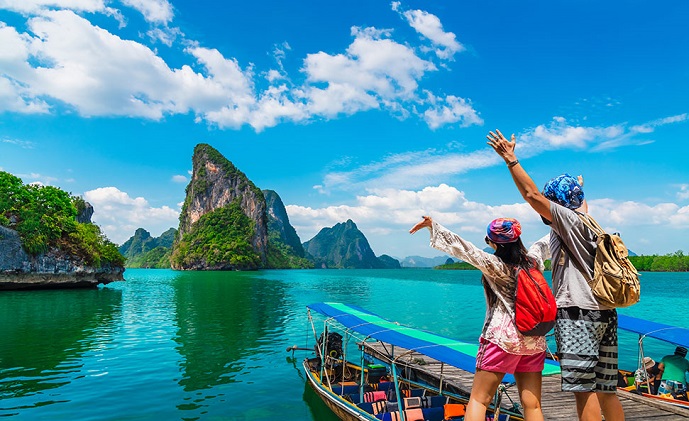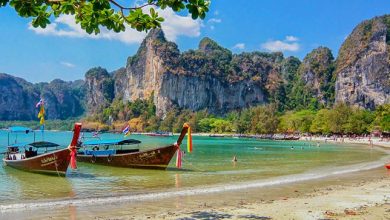Traveling Today and Tomorrow: Embracing the Future of Exploration

Travel is a fundamental part of human experience, offering opportunities for adventure, relaxation, and cultural enrichment. However, the landscape of travel is constantly evolving, shaped by technological advancements, environmental concerns, and changing consumer preferences. This article sportsgurupro.com explores the current trends in travel and anticipates what the future holds for globetrotters.
Traveling Today: Navigating the New Normal
Post-Pandemic Travel Dynamics
The COVID-19 pandemic has left an indelible mark on the travel industry. In 2024, health and safety remain top priorities for travelers and businesses alike. Enhanced sanitation measures, digital health passports, and flexible booking policies have become standard. Travelers are more cautious, often opting for destinations with strict health protocols and fewer crowds.
The Shift to Domestic and Regional Travel
With international travel restrictions and concerns over long-haul flights, there has been a notable shift toward domestic and regional travel. People are exploring their own countries, discovering hidden gems, and supporting local tourism. Road trips, national parks, and rural getaways have become increasingly popular, offering a sense of adventure close to home.
The Rise of Workcations and Bleisure Travel
The pandemic accelerated the adoption of remote work, giving rise to the concept of workcations—combining work with vacation. Many travelers are now extending business trips or working from scenic locations, blending productivity with leisure. This trend, known as “bleisure” travel, is expected to grow, with more destinations offering amenities catered to remote workers.
Technology and Innovation: Shaping the Future of Travel
The Role of Artificial Intelligence
Artificial intelligence (AI) is revolutionizing the travel industry, from personalized travel recommendations to seamless customer service. AI-powered platforms can tailor travel experiences to individual preferences, suggesting destinations, activities, and accommodations based on user data. Virtual assistants and chatbots provide instant support, making travel planning more efficient.
Contactless Travel and Smart Airports
The future of travel will be increasingly contactless, driven by advancements in biometric technology and mobile solutions. Smart airports are adopting facial recognition for check-ins, security, and boarding, reducing the need for physical interaction. Mobile apps allow travelers to manage every aspect of their journey, from booking flights to unlocking hotel rooms, with just a few taps on their smartphone.
Sustainable Travel: A Growing Priority
As awareness of climate change grows, travelers are seeking more sustainable ways to explore the world. Eco-friendly accommodations, carbon offset programs, and sustainable travel practices are becoming key factors in travel decisions. The future will see a rise in responsible tourism, with travelers and businesses alike prioritizing environmental stewardship and ethical practices.
Tomorrow’s Travel Trends: What to Expect
Hyper-Personalized Travel Experiences
Tomorrow’s travelers will expect even more personalization in their journeys. AI and big data will enable travel companies to create hyper-personalized experiences, from custom itineraries to personalized in-flight entertainment. Travelers will have the ability to tailor every aspect of their trip to match their interests, preferences, and needs.
The Growth of Space Tourism
Space tourism, once a concept of science fiction, is on the brink of becoming a reality. Companies like SpaceX and Blue Origin are paving the way for commercial space travel, offering once-in-a-lifetime experiences for those willing to pay a premium. While still in its infancy, space tourism is expected to grow, with the potential to revolutionize how we think about travel and exploration.
Virtual and Augmented Reality: Enhancing Travel Experiences
Virtual reality (VR) and augmented reality (AR) are set to transform the travel experience, both before and during the trip. VR can offer immersive previews of destinations, allowing travelers to explore hotels, attractions, and even cities from the comfort of their homes. AR can enhance on-the-ground experiences, providing real-time information, navigation, and interactive guides through a smartphone or AR glasses.
The Evolution of Sustainable Travel
Sustainability will continue to be a driving force in the travel industry. The future will see greater adoption of sustainable transportation options, such as electric planes and high-speed trains. Destinations will increasingly focus on conservation efforts, limiting the impact of tourism on fragile ecosystems. Travelers will be more conscious of their carbon footprint, seeking out ways to reduce their environmental impact.
Adapting to Tomorrow’s Travel Landscape
Embracing Flexibility and Adaptability
As the travel landscape continues to evolve, flexibility and adaptability will be crucial for both travelers and the industry. Uncertain global events, from pandemics to political changes, can disrupt travel plans. Tomorrow’s travelers will need to be more resilient, prepared for changes, and willing to adapt to new circumstances.
The Importance of Digital Literacy
In a world where technology plays an ever-increasing role in travel, digital literacy will be essential. Understanding how to use travel apps, manage digital documentation, and navigate online platforms will be critical skills for the modern traveler. As more aspects of travel move online, those who are tech-savvy will have a smoother and more enjoyable travel experience.
Conclusion: The Future of Travel
Travel today is a blend of tradition and innovation, shaped by the challenges and opportunities of our time. As we look to tomorrow, the travel industry will continue to evolve, driven by technological advancements, changing consumer preferences, and a growing focus on sustainability. For travelers, the future promises exciting new experiences, from exploring space to enjoying hyper-personalized vacations. By staying informed and adaptable, today’s travelers can look forward to a future of exploration that is more connected, sustainable, and enriching than ever before.



